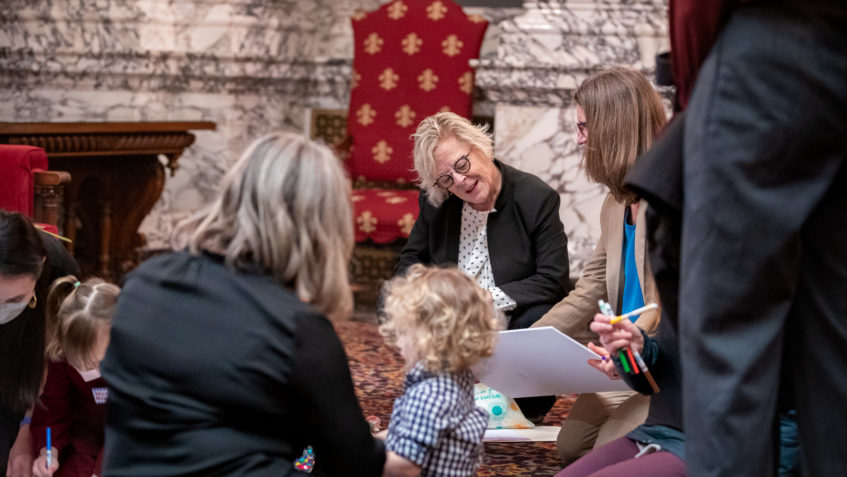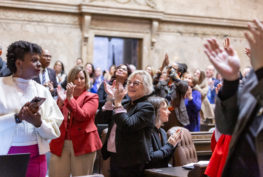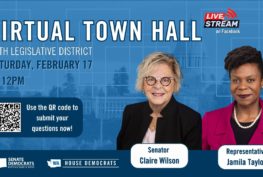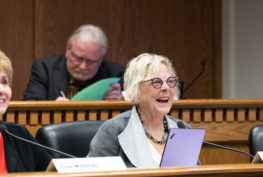Dear friends and neighbors,
One thing lawmakers learn quickly is the way folks don’t hesitate to let us know what they think of the legislation that comes out of Olympia.
If we do something people like, we’ll hear it. And if we do something they don’t like, we’ll really hear it. And that’s exactly the way it should be. Honest, candid feedback is one of the most important tools we have for making sure we’re properly representing the interests of our constituents.
That’s why I encourage folks to contact my office – and why I expect to be held accountable for everything I do as a state senator, from the votes I cast, to the conversations I have with residents of our 30th Legislative District and across the state, to whether people feel welcome and heard when they visit or contact my office.
No shortage of people have made it clear they’re concerned with the state of our public education system and a host of other community concerns. They’ve spoken loudly and I’ve heard them clearly. That’s why I’ve focused intensely in recent years on human services, supports and resources, early learning programs and our state’s childcare system, as well as K-12 educational services and supports that help make sure children get the footing they need at an age that can make a lasting difference.
I often say we are one of the only places in the world where people often have to do the wrong thing in order to get what they need to do it right. No one goes through life planning to fail, and no one wants to fail. And there are plenty of people who have been programmed for a lifetime of struggles because they never had access to the opportunities or support enjoyed by their peers during the critical early years of development. Children who fall behind at an early age typically face tremendous obstacles to catch up and develop not only the abilities but the opportunities needed to successfully navigate life into their teens and adulthood. Human services and early education and childcare offer the most effective ways to address countless difficulties people face later. By putting children on a successful path early, we equip them for a lifetime of success. It’s critical we help them in their early years, not wait until their teens or older where difficult and costly interventions are deployed to try and change what has been reinforced for years.
The landmark reforms and historic investments enacted by my First Start for Kids legislation several years ago seek to do exactly this, even though the results won’t be evident until the youngsters of today are the teens and adults of tomorrow. By eliminating crippling co-pay cliffs, increasing our support for childcare providers through subsidy rate increases, and so much more, we set up far brighter futures for today’s children.
At the same time, though, we can’t turn a blind eye to the older youths and young adults who need help today. To make our communities healthier and stronger, much of my legislation calls for reforms in human services, developmental disabilities, child welfare, juvenile justice, and corrections. We need to increase and improve support for adults trying to reintegrate back into the community as they are released from our correctional institutions and partial release facilities. We need to provide better support and services for people dealing with substance disorders, for victims of domestic violence trying to leave, or for those who have children with challenging and often complex needs – and so much more. We need to improve child welfare and support for families, we need to make sure families’ basic needs are met and we need to make sure individuals are clothed, fed, and housed. These are the kinds of actions that will solve many of the major issues challenging our communities today.
As we tackle these challenges, your voice is invaluable. Many of the best bills we adopt in the Legislature each year start with a constituent who asks a question, flags a problem or a gap in service or support they experienced, or shares a good idea that they think will help create a greater good.
My concentration on human services, early care and education, and K-12 have made me the go-to person on these issues among Senate Democrats. And that’s pretty much how it works for everyone in the Legislature. Although we’re elected from different parts of the state and work hard to make sure our districts’ respective needs are met, each of us takes the lead in one or two major policy areas. Some legislators concentrate on policies that shape public health, or labor and commerce, and so forth. No one can do it all.
It’s an effective system because it allows each of us to learn the many needs and realities in a specific policy area, as opposed to learning just a little about a lot of areas. The only downside, at times, is when we hear from someone upset with legislation on an issue in someone else’s area of specialization.
That’s why feedback and questions about the areas I do focus on – human services and early care and education and K-12 – are all the more valuable, for both the constituent and for me. I’m not just accountable for those areas – I’m the person in the best position to help.
I want to hear your thoughts on whatever issues are on your mind. The more I know about your concerns, the better I can represent you.
Sincerely,
![]()



